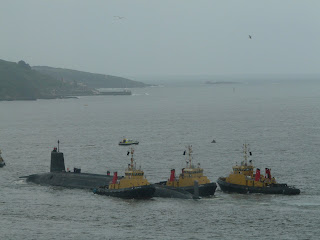 HMS Turbulent below had just returned after being away for 10 months, which apparently is one of the longest deployments for a submarine. HMS Turbulent is a T class hunter killer nuclear powered submarine (sounds alarming!) ... perhaps that is why so much security is in evidence, though luckily I have a good zoom on my camera, so we were not too close - security is a prime consideration. Apparently it is the 5th "Turbulent", the first one was commissioned in 1805, but was captured by the Danes (who were probably trying to save their bacon ... sorry!) - and bore the brunt of the attack. The Navy waited 108 years before the next Turbulent was launched in 1916 (as they have subsequently been through 4 since them, perhaps there is something in the name??)
HMS Turbulent below had just returned after being away for 10 months, which apparently is one of the longest deployments for a submarine. HMS Turbulent is a T class hunter killer nuclear powered submarine (sounds alarming!) ... perhaps that is why so much security is in evidence, though luckily I have a good zoom on my camera, so we were not too close - security is a prime consideration. Apparently it is the 5th "Turbulent", the first one was commissioned in 1805, but was captured by the Danes (who were probably trying to save their bacon ... sorry!) - and bore the brunt of the attack. The Navy waited 108 years before the next Turbulent was launched in 1916 (as they have subsequently been through 4 since them, perhaps there is something in the name??)
The huge crane below, which has since been dismantled, was situated at the Plymouth Naval base of Devonport and was one of the largest cranes in Europe. It was used to refuel nuclear submarines, and with a total weight of 1,450 tonnes, and a lifting job of 120m, it had a lifting capacity of 80 tonnes. Apparently there is to be a new "world class" defueling facility, which is due for completion within the next 5 years, but there are also nasty rumours that the MoD will be moving the submarine fleet from Plymouth to Faslane (Scotland) and the frigates will go to Portsmouth ... thus leaving Devonport with a substantially reduced role. This could be a disaster for Plymouth as a whole, in terms of economy and business investment, and may result in up to 10,000 potential job losses .

The crew of a submarine are known as the "elite" within the Navy, because it is incredibly claustrophobic on a sub (as we saw when we went around one at a Devonport Open Day recently), so to be able to withstand long periods of time at sea must take a lot of internal strength. Often when the subs have surfaced and are coming into port, there are a lot of crew members working outside (see below ... probably sampling the first proper fresh air they have had for a long time)! However, apparently the air within a submarine is actually cleaner than the air outside, and many crew notice the strong smell of the ocean whenever the hatches are opened after a long time at sea.


The crew of a submarine are known as the "elite" within the Navy, because it is incredibly claustrophobic on a sub (as we saw when we went around one at a Devonport Open Day recently), so to be able to withstand long periods of time at sea must take a lot of internal strength. Often when the subs have surfaced and are coming into port, there are a lot of crew members working outside (see below ... probably sampling the first proper fresh air they have had for a long time)! However, apparently the air within a submarine is actually cleaner than the air outside, and many crew notice the strong smell of the ocean whenever the hatches are opened after a long time at sea.

2 comments:
If the Royal Navy left Plymouth,the
sound would presumably be more available for other uses....wouldn't it be a fantastic
venue for national and world watersports events and shows,maritime museums,historic ships,tall ships,marina villages all covered by huge domes, {the O2
on the water!}.....could be the start of a new era! ....Si xx
very interesting stuff
Post a Comment